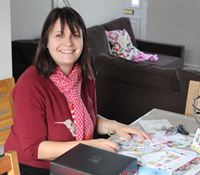Two months after leaving her 12-year job in marketing, Annie Harding has already raised her business profile to become one of Canton’s most recognised independent traders.
 Annie buys her cards wholesale and makes a 30% profit on each one that she sells
Annie buys her cards wholesale and makes a 30% profit on each one that she sellsPhotos by Matt Ayres (unless stated otherwise)
Her greetings card business is so popular that she can’t even order a latte at her local café without being recognised by a group of loyal customers.
Annie wastes no time in telling the group of young mothers about her stall at the local school fair, where she’ll be selling her new range of Christmassy merchandise.
“It’s all about networking,” she grins, sitting back on a squishy sofa and taking a sip from her steaming mug. “It’s just talking to people, that’s all.”
Although hanging out in cafés and craft fairs is fun, the real joy of Annie’s job is that her office is just down the road from here. It doubles as her family’s living room.

All Annie needs to conduct her business from home is a laptop and a handful of cards
Running a business from home is pretty simple, reckons Annie. You just have to work as much as you expect to be paid.
“The fact that I’m in charge of what I earn is great,” she enthuses. “At my old job, it didn’t matter how hard I worked. It wasn’t going to change my income. Now I just need to go out and talk to a few more people, sell a few more cards, and I get paid more.”
Annie isn’t the only one reaping the benefits of self-employment. Earlier this year, the Office for National Statistics revealed that while the number of employed people in the UK fell by 438,000 between 2008 and 2012, self-employment increased by 367,000.
The sharpest transition occurred between April and June last year, when approximately 297,000 people gained self-employed status; 14% of employed people now work for themselves. All of this indicates that the recession has driven a large segment of the population to create their own jobs.
Starting in Cardiff
This year in Cardiff, the government recognised the importance of new Welsh business ventures for boosting economic growth.
Small companies have been encouraged to apply for grants from a £20m pot called the Wales Economic Growth Fund. The scheme is run by Business Wales, who also lend a hand to new ventures through their vast online pool of business resources.
Regular workshops and seminars from Business Wales provide an invaluable mentoring scheme to help fledgling entrepreneurs during those tricky first few months. These are also great platforms for networking.
Not that networking has to mean leaving your house: in a well-wired city like Cardiff, it’s even easier to connect with others via social media. Online business guru and startup mentor Neil Cocker knows this better than most.

Home businesses should have a strong presence on Twitter and Facebook as well as a website
Neil was responsible for setting up record label Plastic Raygun in Cardiff after graduating from university. Nowadays, he’s better known as the founder and managing director of Dizzyjam, a popular internet merchandising service for independent musicians.
“The internet infrastructure in Cardiff is improving all the time, especially with the launch of a free city centre Wi-Fi network next year,” he says. “And when you get bored of the home office, there’s loads of fantastic cafés.”
Money matters
There are inevitably challenges to self-employment. Having mentored numerous businesses via a local entrepreneurial community called Cardiff Start, Neil recognises that the toughest thing about starting your own business is access to finance.
“The banks don’t seem to be lending, and there aren’t enough private equity investors in Wales who are willing to invest,” he acknowledges.
“Small businesses often need a war chest in order to help them grow, otherwise they’re chained to tiny growth, which usually isn’t enough to increase the chances of better revenues, profits and job creation.
For Annie, staying financially sustainable means keeping modest ambitions. She began selling cards before leaving her old job, so was able to gauge how much time and effort it would take for her to make more money from it.
“You have to remember what’s most important,” she says, watching one of the chatty mums from earlier lift a giggling toddler back to his booster seat.
“For me, working from home means spending more time with my family. Even if doing this meant making less money, I could never go back to my old job.
“It all depends on your circumstances, but I think being in charge of your own destiny is so much more rewarding than working for someone else.”
